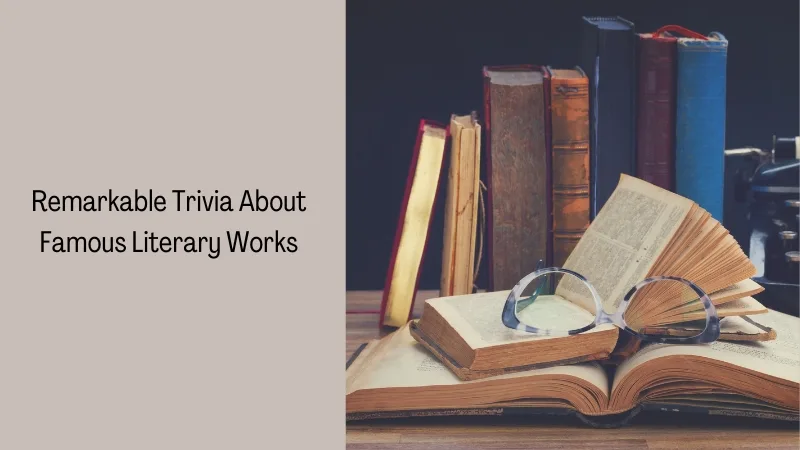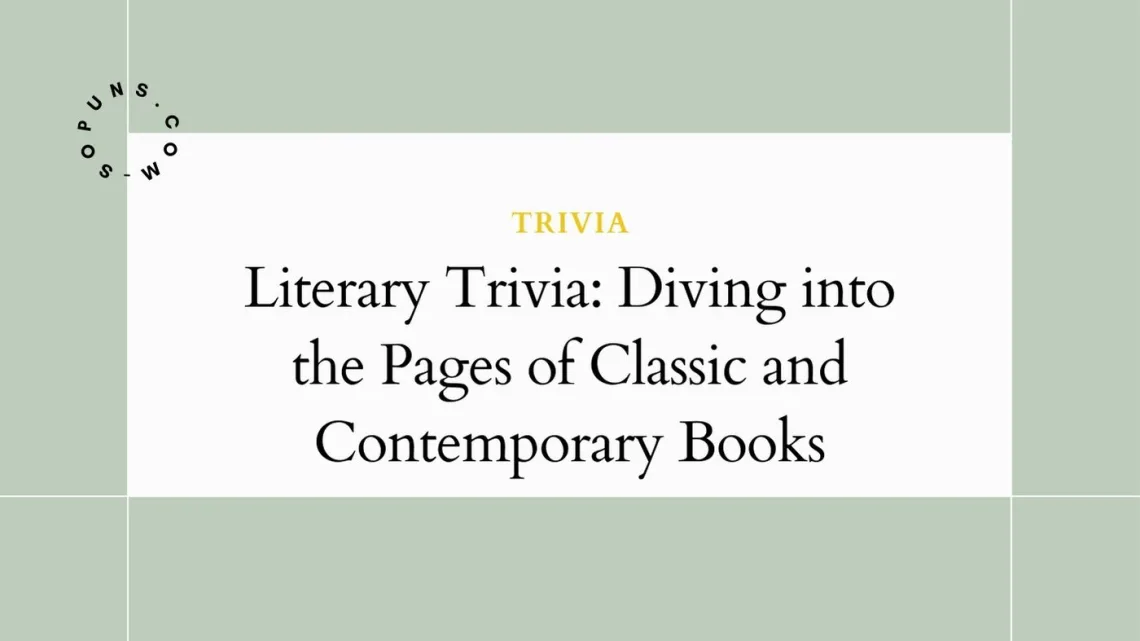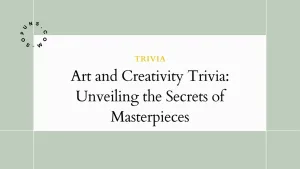For avid readers and bookworms, few things delight more than discovering little-known literary facts and tidbits. Literature trivia offers a fascinating glimpse into the lives of famous wordsmiths, the intriguing backstories behind renowned books, and obscure particulars about our most beloved characters. From the Brontë sisters’ modest beginnings to the rejected titles for Pride and Prejudice, a world of captivating literary lore awaits.
Join us as we leaf through the annals of literary history in search of intriguing author anecdotes, manuscript mysteries, and bookish trivia guaranteed to dazzle and delight. Who knows what treasures we might uncover between the pages?
Iconic Authors and Their Intriguing Life Stories
Many literary legends led lives as fascinating as their famous works. Did you know that…
- J.K. Rowling was nearly penniless and a newly divorced single mother when she wrote the first Harry Potter book in Edinburgh coffee shops. She is now worth over $1 billion.
- F. Scott Fitzgerald and his wife Zelda were notorious for their wild Jazz Age parties and lavish lifestyle, before hitting hard times when his writing income plummeted.
- Sylvia Plath met her future husband, poet Ted Hughes, at a wild party in Cambridge where she bit him on the cheek when he tried to kiss her. Their passionate but troubled marriage would later inspire some of her most famous confessional poems.
- James Joyce’s daughters reputedly burned many of his intimate love letters to his wife Nora to protect his reputation. Who knows what secrets were reduced to ashes?
- Agatha Christie’s mysterious 11-day disappearance in 1926 sparked a nationwide search in England. She claimed amnesia but never revealed what happened.
These tantalizing glimpses into the lives of literary lions reveal the real personalities behind the words we know and love. Delving into author anecdotes uncovers inspiration, struggle, scandal, and serendipity.
Remarkable Trivia About Famous Literary Works

In addition to author backgrounds, the stories behind famous works often contain juicy morsels of trivia. For example…
- Jane Austen initially titled her classic book First Impressions before changing it to Pride and Prejudice. Can you imagine Mr. Darcy and Lizzie Bennet without that iconic name?
- Vladimir Nabokov carried around index cards with an elaborate chronology while writing Lolita to track minute details like what candy Lolita was eating on what day. Now that’s meticulous!
- Margaret Mitchell was so overwhelmed by the instant fame that came with Gone with the Wind that she never wrote another novel, saying “I would rather have been happier.”
- Moby Dick was a total flop when first published in 1851, only gaining acclaim decades later. Melville earned a measly $556 for what became a literary classic.
- The Lord of the Rings manuscripts were rescued from a bonfire when Tolkien got cold feet about publishing. We almost lost Middle Earth!
Peeking behind the curtains of our favorite books offers a new lens on how they came to life. From working titles to author angst, early draft disasters to runaway success, such literary lore spices up the reading experience.
Lesser-Known Facts About Beloved Characters and Settings
Beyond general publication trivia, granular details about specific characters and settings enthrall true book buffs eager for deeper insights. For instance…
- Tolkien only revealed in letters published posthumously that Gandalf was an incarnation of an angelic being from another realm. Blew some minds!
- Margaret Mitchell drew inspiration for Scarlett O’Hara from her own great-grandmother, who survived the Civil War and was known for her strong will and personality.
- Without ever visiting California, Jack Kerouac wrote his quintessential cross-country journey novel On the Road in a 20-day frenzy fueled by coffee and Benzedrine.
- While writing In Cold Blood, Truman Capote developed an uncomfortably close relationship with one of the killers he was profiling. Talk about blurred lines!
- Ian Fleming named his super spy after an ornithologist he read about in a WWII book called Birds of the West Indies. And so James Bond was hatched!
These bits of backstory about the imagined places and people we cherish bring us closer to their creators’ visions. Tracking breadcrumb clues through the lives and minds of authors and characters cultivates diehard devotees.
The Role of Trivia in Book Clubs and Reading Groups
Beyond just titillating readers, swapping literary trivia plays a valuable role in book clubs and reading groups. The right tidbits can enhance the discussion by…
- Providing historical or cultural context about the author’s background
- Explaining real-life inspiration for settings and storylines
- Revealing early drafts and editing evolution to better understand the writer’s creative process
- Highlighting interesting connections between an author’s life and their work
- Encouraging deeper examination of themes and symbolism
- Sparking debate about character motivations and plot points
- Uncovering hidden meanings readers may have overlooked
Wielding literary trivia as a discussion-starting tool makes book clubs delightful and interactive. A few fun icebreakers get everyone engaged and discovering new angles on their reading.
How Literary Trivia Enhances the Reading Experience
Beyond book club fodder, a flair for literary trivia can enrich the solo reading experience in meaningful ways. A few fascinating nuggets about an upcoming read can…
- Build anticipation and excitement to dive into a new book
- Provide engaging context that makes the opening pages more compelling
- Enable readers to visualize setting details more vividly
- Strengthen understanding of references to historical events or figures
- Offer clues to help decipher subtle symbolism or themes
- Provide touchstones during reading to deepen the connection to the characters
- Inspire readers to notice possible connections to the author’s own life
- Motivate readers to hunt for clever parallels, motifs, and devices
A little advanced intel gives active reading a boost. Weaving vivid literary lore into the reading fabric results in a richer, hybrid experience blending fact and fiction.
Trivia Questions That Delve into Literary Analysis and Themes
For true literature scholars, some trivia goes beyond surface fun facts to probe deeper analysis and interpretations. Consider these thought-provokers:
- What does the famous opening line “Call me Ishmael” symbolize in Melville’s epic? (alienation, existential ennui)
- Why are doubles, mirrors, and divided selves a recurring motif in Dostoevsky’s oeuvre? (captures his internal philosophical struggles)
- How do the detailed wildflower descriptions in Willa Cather’s prose represent themes of fertility and femininity? (highlight passion and frailty through symbolism)
- What do the violent storm scenes in King Lear reveal about Lear’s inner turmoil and descent into madness? (externalizes his inner psychological chaos and upheaval)
- How does Morrison use “jazz” techniques like repetition, rhythm, and improvisation in her experimental novel Jazz? (commentary on the vibrancy of African-American culture)
These thought-provoking trivia springboards delve past shallow factoids into literary analysis essentials like symbolism, theme, and style. They challenge us to read attentively on multiple levels.
Using Trivia to Foster a Life-Long Love of Reading

Perhaps most importantly, a flair for literary trivia imparts core skills that cultivate life-long reading habits. It teaches us how to…
- Read actively and ask questions to uncover deeper meanings
- Make connections between an author’s influences and their writing
- Notice patterns and embedded meanings beyond surface plot points
- Develop theories about symbols and themes in a text
- Connect what we read to the author’s life experiences
- Appreciate how creative works reflect historical and social contexts
- Consider how an author’s style and word choices shape meaning
- Compare how similar themes recur across an author’s body of work
- Understand how an author’s personal struggles may manifest in their characters
Literary trivia thus becomes a pathway into the minds of writers, building skills to read, analyze and appreciate fiction on levels far beyond breezy entertainment.
Frequently Asked Literature Trivia Questions
What was Charles Dickens’s first published work?
Sketches by Boz (1833)
Which Bronte sister wrote Jane Eyre?
Charlotte Bronte
What is the best-selling novel of all time?
Don Quixote
Who wrote the post-apocalyptic novel The Road (2006)?
Cormac McCarthy
Who wrote the famous opening line “It was the best of times, it was the worst of times”?
Charles Dickens (A Tale of Two Cities)
Which Stephen King novel takes place mostly in the fictional Overlook Hotel?
The Shining
What was Truman Capote’s seminal true crime book documenting a 1959 murder?
In Cold Blood
Who wrote the Pulitzer Prize-winning novel To Kill a Mockingbird?
Harper Lee
Conclusion: A Literary World Waiting to be Discovered
Like a treasure hunt, diving into literary trivia allows us to uncover dazzling nuggets about beloved books and authors. These tantalizing facts humanize famous writers, provide priceless publication lore, and reveal obscure particulars about unforgettable characters. Beyond just fun distraction, trivia hones analytical skills that enrich reading and empower deeper interpretation. With so much yet undiscovered between covers, our literary journey is just beginning. Let’s turn the page together and continue exploring! What intriguing treasures await around the next bend? Our sense of wonder always leads the way.






No Comments